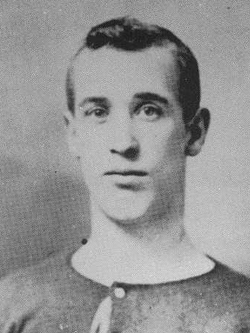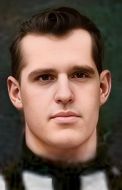
George
and

William "Willie" Key
George and Willie Key were brothers born in Glasgow in 1878 and 1881 respectively, both of whom were fine footballers, together totalling over two hundred and fifty senior club appearances and each with a single Scottish cap (against Ireland) to their names, albeit five years apart. Each played at half-back, Willie on the right and entirely in Scotland, George on the left and on both sides of the border. Both began their careers with Parkhead in junior football. Both would live out their later lives in Renfrewshire, George in Barrhead but die in Paisley, Willie in Paisley but die in Glasgow. Both were in teams defeated in the Scottish Cup Final, whilst George was also victorious in the same competition.
Their father was a joiner from Angus, their mother from Johnstone, hence perhaps the Paisley connection. George was their third child, Willie their fourth. The boys would be brought up in the place of Willie's birth, Cathkin Place, Shettleston and in 1901 both are still at home, Willie recorded as a Baker, whilst playing for Vale of Clyde and winning a junior cap, but George already as a Football Player, but at five foot three inches by reputation to become the following year the smallest ever to play for the country. By then he has already been with Hearts for two seasons and, having already also been a junior international and a winner of the Junior Cup, had just been promoted into the First Team in the year that would culminate with a senior Cup medal.
However, In 1905 George Key, having fallen out with Hearts over money, was to be one of the host of Scots players to be signed under International team-mate, Jacky Tait Robertson, to newly-formed Chelsea. He played in the London club's first League game and was to stay for four seasons, struggling with injury from the second, until retirement in 1909. Meanwhile Willie, a slower developer, had had a season with Queen's Park as an amateur, also being capped five years after his brother, before in 1907 at the age twenty-six finally turning professional with St. Mirren.
The impression is that the Paisley club was in something of a state of perhaps heavy-handed flux at the time. In Willie's first season, he playing right-half, it had reached but been heavily defeated, 5-1, by Celtic in the Cup Final, the last two goals coming down its left. The Buddies right back moved on at the end of the season. Then a promising Bob Millar had two seasons at the club before in 1911 leaving and permanently for America so perhaps avoiding the problem Willie Key had encountered a year earlier. He, despite being very much a first team regular, and the club parted ways but it refused to release his registration without payment of a fee. It forced Willie, in order to continue playing, to do so outwith the League, joining for a season each Beith and then Royal Albert in Larkhall, both in the short-lived, rival Football Union, until the hanging up of his boots in 1912 at just thirty.
By then Willie was probably already back at his old trade, if he had ever gone away. Remaining in Paisley for the rest of his days he worked first as a pastry baker and then as a bakery foreman. This as George returned North, to Glasgow and the family in 1911, working as Foundry Moulder. He then served in the army in The Great War, in 1918 winning the military medal for bravery, before, as his parents moved to Largs, finally settling in Barrhead, where there were family connections, and working as a gas-works labourer until retirement. And it would be from Barrhead that he would pass away in 1958, in Paisley's Royal Alexandra Infirmary, aged eighty to be buried in Paisley too, in Woodside Cemetery.
George Key never married but Willie did, in 1904 in Bellshill. His wife was Margaret Duncan, herself the step-daughter of a baker. And the couple settled into the flat in Dunn St., Paisley they and their surviving daughter and son would occupy at least until Willie's death, seven years before his brother's, in 1951 at the age of sixty-nine, having been taken from there to the Glasgow Western Infirmary for treatment. He is also thought to be buried in Woodside Cemetery, outlived by Maggie by the best part of decade. She would pass away in 1960, still in Paisley, aged seventy-five.
Birth Locator:
1878 - 183, Slatefield St., Dennistoun, Glasgow (George)
1881 - 5, Cathkin Place, Shettleston, Glasgow (Willie)
Residence Locations:
1881 - 5, Cathkin Place, Shettleston, Glasgow (George)
1891- 1901 - 5, Cathkin Place, Shettleston, Glasgow (George and Willie)
1904 - 8, Cathkin Place, Shettleton, Glasgow (Willie)
1911 - 94, Eastmuir, Shettleston, Glasgow (George)
1911-51 - 1, Dunn St, Paisley (Willie)
1958 - Maybank, 14, Gertrude Place, Barrhead, Renfrewshire (George)
Death Locator:
1951 - Western Infirmary, Glasgow (Willie)
1958 - Royal Alexandra Infirmary, Paisley (George)
Grave Locator:
Woodside Cemetery, Paisley (George)
Cremated at Woodside Crematorium, Paisley (Willie)
Back to Johnstone & Paisley,
to the Southern Suburbs Trail
the Cart Trails
or the SFHG Home page